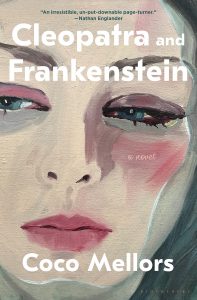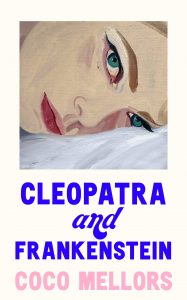 Published by Bloomsbury US/ Fourth Estate UK 8/17 February
Published by Bloomsbury US/ Fourth Estate UK 8/17 February
384pp, hardback
Reviewed by Elsbeth Lindner
Might you be tempted by a romance among high-living, media-employed New Yorkers, infused with drugs, creativity, psychological burdens and heartbreak? Would you be even more attracted if that mix were cut with Jewish comedy? If the answer is yes, then this novel – with its regal/gothic, or is it comedy duo? title – is for you.
Starting out as a meet cute love story, it swiftly introduces gorgeous, blonde, twenty-something British artist Cleo, with a mentally ill mother and some painting talent, who bumps into ad-agency star Frank, two decades older, also burdened by parental issues and in his case a dependency on alcohol. Flirtation is swiftly followed by love, co-habitation and marriage but, despite the couple’s beauty, talent, good taste and devoted friends, their demons cannot, for long, be kept at bay.
So far so enjoyable, as high octane modern love stories go. Mellors has an eye for fashion, and brittle connections, although her characters – see a grim lunch at the Grand Central Station Oyster Bar – can tend toward the one-dimensional. But this is easily-consumable contemporary fare, the couple at its core is compelling, and there are plenty of other beautiful people in their circle, like Frank’s sexually insatiable Scandinavian friend Anders; Frank’s black stepsister Zoe, an actress wannabe who takes too many risks; and Cleo’s gay best friend Quentin who the reader just knows is destined for worse things.
But who was expecting Eleanor, the LA comedy-writing transplant who arrives as a copy-writer in Frank’s agency and will soon offer a more frumpy balm to Cleo’s exquisite fragility? And even more surprising, yet rather to be relished, is Eleanor’s first-person account of returning to her Jewish mother’s New Jersey household, with all the one-line humor that might entail, in this painfully non-Manhattan, anti-hip setting – all suburbia, bird-feeders, public transport and bad food eaten on weary sofas in front of the TV.
Same book? Yes. The novel emerges as a kind of modern/traditional fusion blessed with soapy charm to offset some of the mawkishness of Cleo and Frank’s faltering relationship, which offers its own predictable arc but concludes with grace.
So there you have it – sushi and gefilte fish on the same plate. It’s an odd, yet still palatable combo, and Mellors’ debut confirms that she can deliver readable modernity with a comic twist. Mazel tov.
